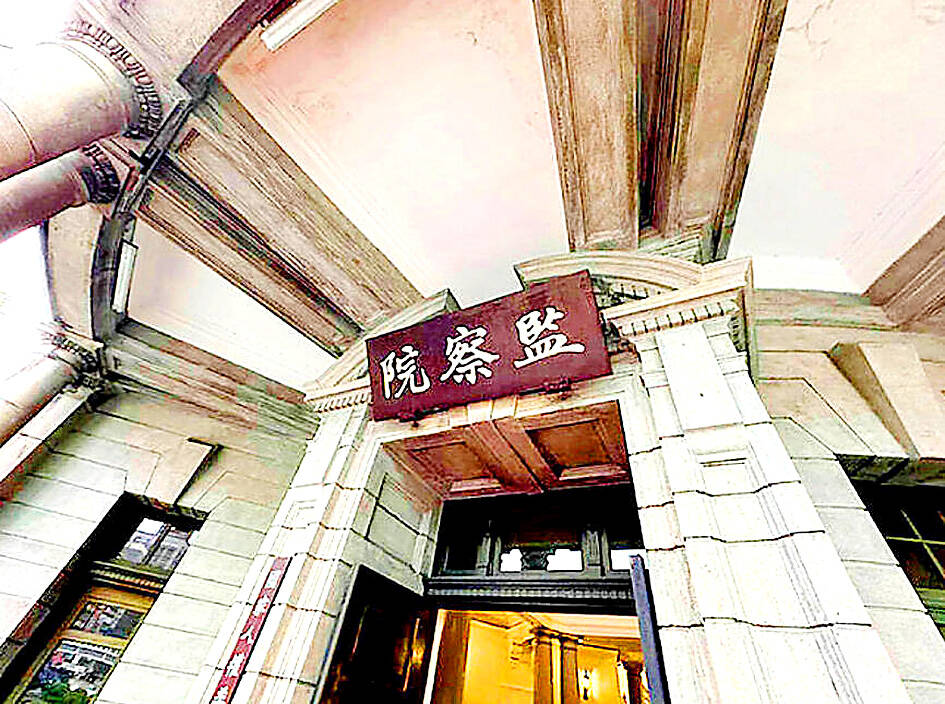The Control Yuan has asked the Ministry of Environment and the Kaohsiung City Government to review and adjust their use of pesticides in mosquito control.
The issue stemmed from a complaint Kaohsiung City Councilor Chung Yi-chung (鍾易仲) received in 2023 saying that the city government’s Department of Health had reduced the dilution ratio of mosquito pesticides by 30-fold in its effort to prevent dengue fever — a high concentration that could harm human health.
The department at the time said in response that the dilution ratio had remained unchanged over the past two decades.

Photo: Taipei Times
The complaint was forwarded to the Control Yuan, which on Wednesday last week reviewed and approved the investigation results of its Committee on Social Welfare and Environment Hygiene Affairs.
Control Yuan member Chi Hui-jung (紀惠容) on Sunday said the city government was found to have adjusted repellents’ dilution ratio for urgent mosquito control, as well as used an effective dose per unit area to evaluate whether its use of pesticides complies with regulatory requirements.
However, the department did not account for different tools and contexts of their implementation, and part of its repellent use might be excessive based on specialists’ calculations, Chi said.
The city government should apply mosquito repellents within the suggested dilution ratio determined in the Executive Yuan’s dengue-control meetings, she said.
In the Guidelines for Dengue/Chikungunya Control, the Centers for Disease Control recommends that local governments use chemical space spray solutions, such as ultra-low volume spraying or thermal fogging (including smoke bombs), to control adult mosquito populations, she said.
The Control Yuan’s investigation found that most local governments used thermal foggers to apply pesticides used to kill adult mosquitoes to control dengue fever, while power sprayers are the most recommended tool on the product labels of repellants approved by the environment ministry, Chi said.
Only 7.19 percent of repellant products specify that thermal foggers can be used, but current practices in dengue prevention are markedly different, she said.
Therefore, the ministry should address local governments’ noncompliance with product labeling requirements for mosquito repellants, she said.
It should also establish more explicit guidelines on the use of different tools for local governments to properly administer pesticides used in dengue fever control and prevention, she added.
Additional reporting by CNA

Taiwan yesterday condemned the recent increase in Chinese coast guard-escorted fishing vessels operating illegally in waters around the Pratas Islands (Dongsha Islands, 東沙群島) in the South China Sea. Unusually large groupings of Chinese fishing vessels began to appear around the islands on Feb. 15, when at least six motherships and 29 smaller boats were sighted, the Coast Guard Administration (CGA) said in a news release. While CGA vessels were dispatched to expel the Chinese boats, Chinese coast guard ships trespassed into Taiwan’s restricted waters and unsuccessfully attempted to interfere, the CGA said. Due to the provocation, the CGA initiated an operation to increase

CHANGING LANDSCAPE: Many of the part-time programs for educators were no longer needed, as many teachers obtain a graduate degree before joining the workforce, experts said Taiwanese universities this year canceled 86 programs, Ministry of Education data showed, with educators attributing the closures to the nation’s low birthrate as well as shifting trends. Fifty-three of the shuttered programs were part-time postgraduate degree programs, about 62 percent of the total, the most in the past five years, the data showed. National Taiwan Normal University (NTNU) discontinued the most part-time master’s programs, at 16: chemistry, life science, earth science, physics, fine arts, music, special education, health promotion and health education, educational psychology and counseling, education, design, Chinese as a second language, library and information sciences, mechatronics engineering, history, physical education

The Chinese military has boosted its capability to fight at a high tempo using the element of surprise and new technology, the Ministry of National Defense said in the Quadrennial Defense Review (QDR) published on Monday last week. The ministry highlighted Chinese People’s Liberation Army (PLA) developments showing significant changes in Beijing’s strategy for war on Taiwan. The PLA has made significant headway in building capabilities for all-weather, multi-domain intelligence, surveillance, operational control and a joint air-sea blockade against Taiwan’s lines of communication, it said. The PLA has also improved its capabilities in direct amphibious assault operations aimed at seizing strategically important beaches,

‘MALIGN PURPOSE’: Governments around the world conduct espionage operations, but China’s is different, as its ultimate goal is annexation, a think tank head said Taiwan is facing a growing existential threat from its own people spying for China, experts said, as the government seeks to toughen measures to stop Beijing’s infiltration efforts and deter Taiwanese turncoats. While Beijing and Taipei have been spying on each other for years, experts said that espionage posed a bigger threat to Taiwan due to the risk of a Chinese attack. Taiwan’s intelligence agency said China used “diverse channels and tactics” to infiltrate the nation’s military, government agencies and pro-China organizations. The main targets were retired and active members of the military, persuaded by money, blackmail or pro-China ideology to steal